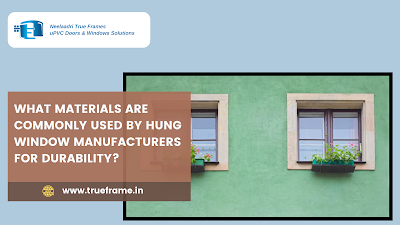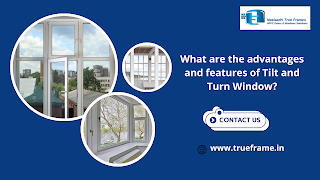Introduction:
Choosing hung windows for your home should be based on their durability. Material selection plays an important role in determining windows' performance, durability, and aesthetic appeal. Both residential and commercial properties use hung windows, which slide vertically or horizontally. The windows are not only stylish and easy to operate, but they also provide excellent ventilation and natural light. Materials are the key to the answer.
Vinyl:
As a result of their excellent durability and ease of maintenance, vinyl windows are a popular choice for manufacturers of hung windows. Vinyl windows are made from polyvinyl chloride (PVC), which offers strong resistance to extreme heat, cold, and humidity. Vinyl does not warp, crack, or require constant painting, unlike wood. This product is also resistant to pests, such as termites, making it an excellent choice for those who are interested in long-term durability. This material also offers superior energy efficiency, as it is highly resistant to heat transfer, thereby maintaining a warmer environment in the winter and a cooler environment in the summer.
Wood:
Despite its natural beauty and superior insulation properties, wood has been a classic material for windows for centuries. Even though wood windows are incredibly durable when properly maintained, they need some maintenance. If exposed to moisture, wood frames can rot, warp, and develop insect damage. However, high-quality wood windows treated with preservatives or sealed with protective coatings can last for many years. Furthermore, wood offers a customizable look, allowing homeowners to choose from a variety of finishes and stains that can complement any home design.
Fiberglass:
Hanging windows are made from fibreglass, which is one of the toughest materials available. Because of its impressive strength-to-weight ratio, fibreglass is becoming increasingly popular among manufacturers. The material is highly resistant to expansion and contraction, which means that it will not warp, crack, or bend under adverse weather conditions. The excellent insulation properties of fibreglass make it highly energy-efficient as well. The material can also be moulded to mimic the look of wood, giving it both the aesthetic appeal of natural materials and the durability of fibreglass. Even though fibreglass windows tend to be more expensive, they are an excellent investment over the long term.
Aluminium:
Aluminium windows are known for their modern aesthetic, slim profiles, and impressive strength. While aluminium alone may not offer the best insulation properties, modern hung window manufacturers often use thermally broken aluminium frames that include insulation within the frame to enhance energy efficiency. Aluminium is incredibly durable and resistant to corrosion, making it an excellent choice for homes in coastal or humid environments. It also requires minimal maintenance compared to wood and vinyl, though it can be prone to dents and scratches. However, with the right protective coatings, aluminium windows can withstand the elements for many years.
Composite Materials:
Composite window materials are becoming more popular among hung window manufacturers due to their ability to combine the best features of wood, vinyl, and fibreglass. These windows are made by combining different materials, such as wood fibres and resins, to create a product that mimics the look of wood but offers better durability and lower maintenance. Composite windows are resistant to moisture, insects, and rot, which makes them a durable choice for homeowners who want the aesthetic appeal of wood without the associated maintenance. Additionally, composite windows provide excellent thermal insulation, helping to keep energy costs down.
Glass:
The material of the frame is essential for the durability and performance of a hung window; however, the glass used is also equally important. The most common choice for hung windows is double- or triple-glazed glass that is insulated. Not only is this type of glass energy-efficient, but it also provides increased durability against the elements. Many high-performance glass options feature coatings that protect against UV rays and reduce the risk of scratches. Laminated or tempered glass is often used for additional security, as it is more resistant to breaking than regular glass.
Conclusion:
Consider the durability, energy efficiency, and maintenance requirements of the material when choosing hung windows. Vinyl, fibreglass, and composite materials are some of the most durable materials available, and they offer low maintenance and high-performance features that will last for a long time. While wood has a timeless aesthetic, it requires greater care and maintenance to maintain its durability. Besides offering sleek designs and exceptional strength, aluminium windows also offer additional energy efficiency and protection.
For more information:
Phone Number: +91 9886591011
E-Mail: sales@trueframe.in
Website: www.trueframe.in


Comments
Post a Comment